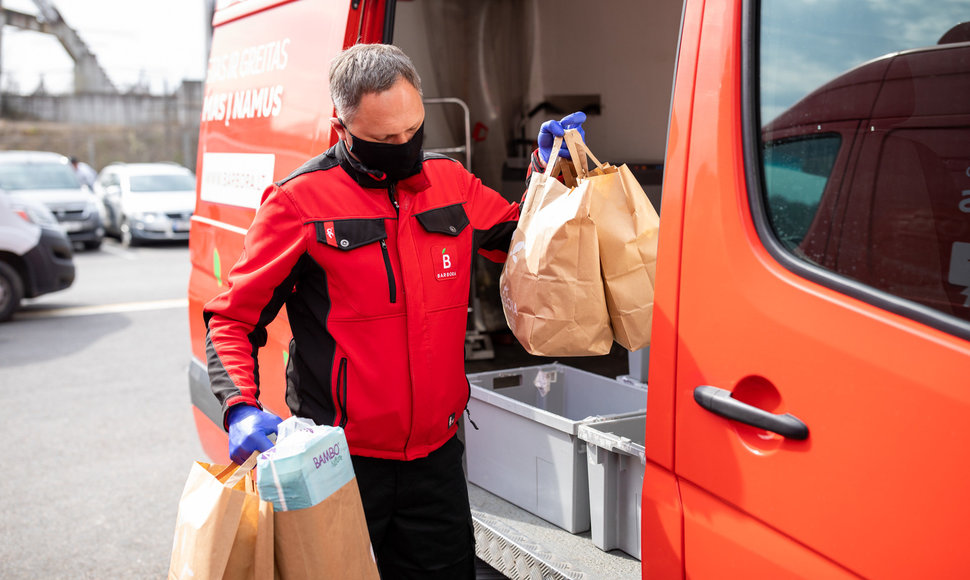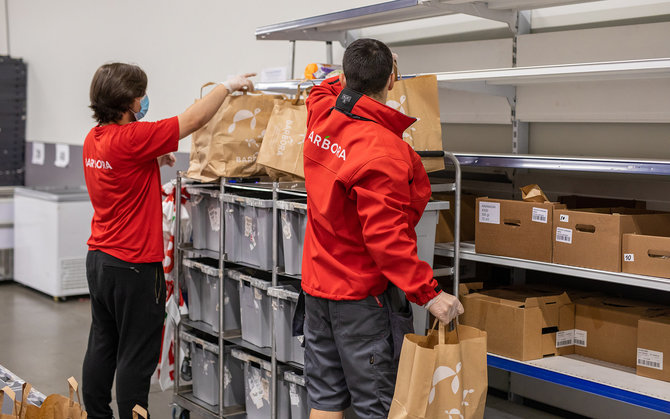“We have observed a growth dynamic in orders and client numbers, which is akin to the period prior to the lockdown. Similar to early March, in September we observed that on days when COVID-19 hotspots were announced in Lithuania or neighbouring countries, the number of orders would spike. September was even more intense – we already delivered more orders than we did in March. Regular clients have been purchasing necessities more actively online, with this customer base has expanded significantly following the lockdown, and we are also seeing new clients returning,” Barbora CEO Andrius Mikalauskas commented on the current situation.
According to the retailer’s data, residents of major urban centres are not the only ones who have been more actively shopping online, but so have customers outside of the cities. Orders via Barbora Express have risen by 45% in smaller cities and towns in September as compared to August. According to A. Mikalauskas, if e-commerce was too much of a novelty for many residents to get used to in the spring, now it is simpler and faster for them to transition from physical storefronts to electronic ones. Thus, online grocery orders are predicted to grow to a sustainable level after a small dip in order volume in the summer.
Spontaneous shopping replaced by regular habits
Electronic stores were among the first to observe consumers’ increasing concern about the coronavirus pandemic in early March. At that time, online shopping was spontaneous and based on growing uncertainty and concern over the new virus. Customers shifted their shopping to the electronic domain near-overnight and their shopping carts grew by 50% or more.
Half a year under pandemic conditions formed new shopping habits and skills, making current customer behaviours more rational and planned out, and shopping carts now contain the products that will be needed over the coming days, rather than intended to be stored in one’s kitchen cupboards. Unlike during the lockdown, customers are now shopping more often, but in smaller quantities – the average shopping cart has remained stable while the number of COVID-19 cases has been growing.
“During the lockdown, many clients tried online shopping for the first time. And while some individuals returned to physical stores after the lockdown, a significant number of them continue shopping online, just differently. If before, customers would shop online for long-lasting food products and household goods, and going to shops for everyday goods, we are now seeing that quick consumption product such as bread, milk, etc. are now bought online. Considering the risk of continued increases in coronavirus infections, we predict that this trend will only grow stronger – online retailers will become the usual means of shopping for ever more people and an alternative to physical stores,” A. Mikalauskas said about customers’ new shopping habits.
According to the company head, the formation of new customer habits was also influenced by solutions implemented in the online store, which allows a larger number of clients to have their orders delivered on the same day.
Will the lockdown scenario repeat in e-commerce?
The moods in the electronic grocery and everyday retail markets are currently calmer than when the lockdown started. Market players are facing the increased influx of orders while staying prepared for various pandemic scenarios. According to the head of Barbora, solutions implemented during the lockdown were not for the short term – they fundamentally rearranged the retailer’s processes and capacities to serve clients under crisis conditions.
“Just a few months of lockdown encouraged the market and ourselves to achieve progress that would otherwise have required five years. Barbora alone grew to double its size over this brief period. Now, all the solutions we have implemented allow us to meet autumn with doubled order collection and customer service capacities. Furthermore, having gone into top gear during the lockdown, we have not shifted down and continue to seek solutions to improve the user shopping experience,” the head of Barbora says.
Even after the lockdown, online grocery shopping has not returned to pre-lockdown levels. Even in July, which could be seen as the calmest month over the entire pandemic, both the influx of orders and the active client base remained larger than during the first months of the year. Currently, 35% more Barbora staff collect and deliver goods to clients, there are 25% more orders, and 20% more customers buy their groceries online than before the lockdown.















